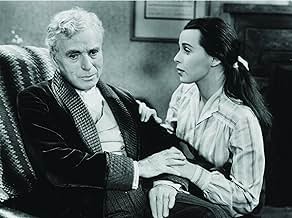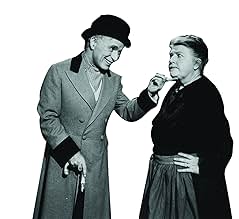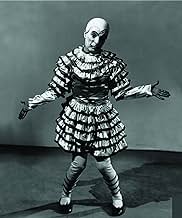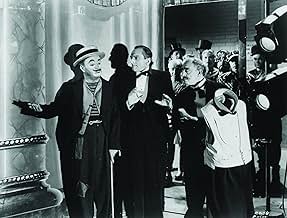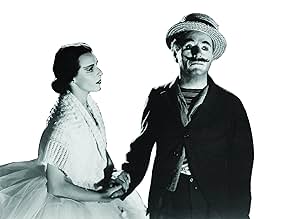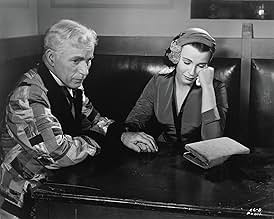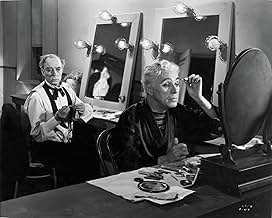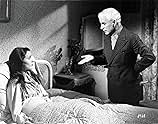IMDb RATING
8.0/10
23K
YOUR RATING
A fading comedian and a suicidally despondent ballet dancer must look to each other to find purpose and hope in their lives.A fading comedian and a suicidally despondent ballet dancer must look to each other to find purpose and hope in their lives.A fading comedian and a suicidally despondent ballet dancer must look to each other to find purpose and hope in their lives.
- Won 1 Oscar
- 7 wins & 4 nominations total
Molly Glessing
- Maid
- (as Mollie Glessing)
Leonard Mudie
- Dr. Blake - Calvero's Doctor
- (as Leonard Mudi)
'Snub' Pollard
- Street Musician
- (as Snub Pollard)
Billy Lee Aimone
- Little Boy
- (uncredited)
Featured reviews
Charles Chaplin is, at least for me, the best film maker of all time. And Limelight is his best film. It is one of the 10 films I have given 100/100.
The film is about this old comedian who can't find himself a job. He saves a young girl who tried to commit suicide. Well, they become friends and stuff.
Simply the film is perfect. There is nothing bad I could say about it. Well, maybe the ballet scene was too long (but maybe I just can't concentrate enough). The script, the music, the actors, the whole philosophical structure of the film! They are all perfect. And the end of the film is something so beautiful that you really have to see it.
If there is one thing you have to see, make sure it'll be Chaplin's Limelight!
The film is about this old comedian who can't find himself a job. He saves a young girl who tried to commit suicide. Well, they become friends and stuff.
Simply the film is perfect. There is nothing bad I could say about it. Well, maybe the ballet scene was too long (but maybe I just can't concentrate enough). The script, the music, the actors, the whole philosophical structure of the film! They are all perfect. And the end of the film is something so beautiful that you really have to see it.
If there is one thing you have to see, make sure it'll be Chaplin's Limelight!
Most ordinary people fall into a role and a persona in their lives, and tend to not veer very far from it if it provides for them. Perhaps, due to extreme situations, they may find it necessary to reinvent themselves once or twice and rise to the occasion or fall into dissolution.
An artist like Chaplain had to reinvent himself over and over again over four decades, particularly in a medium that was changing every few years. That's probably why he had so many failed marriages with younger woman; he had to feel like a "player" to keep the flow going and fight back the doubt and anxiety (and the terror of becoming irrelevant) that inevitably begins to haunt creative men in their twilight years. Don't underestimate the power of sex magic!
Limelight is a film about those demons, and the immense courage (and yes, the love of a much younger woman, too, doesn't hurt), that is required to triumph over them. Still, everyone knows there is one specter that no man can outrun -- Death. Chaplain masks this existential dimension in layers of sentimental melodrama which you will have to decide for yourself is effective, but I think he does this intentionally to smuggle in some deep and darker themes that filmmakers like Bergman would become famous for continually exploring masterfully.
I found myself going back and forth with Limelight; there are times when the melodrama overpowers the film, and the pedestrian cinematography doesn't help matters. A few times I felt like I was watching the old Abbot and Costello TV show, particularly the apartment scenes. However, Chaplain is such an immense presence you can't help be engaged and encouraged to keep watching because you want so much for his character Calvero to triumph. His co-star, Claire Bloom, is quite effective, too, and she has several "looks" in this film to contrast and mirror the ongoing struggle the old comedian in having internally.
Getting on in years myself, and feeling washed up and without hope and purpose, Calvero's plight and faltering desire to once again command the Limelight was quite cathartic. I was amazed by his final performance with Keaton; when Calvero starts rocking that violin like Eddie Van Halen in his prime, I was in a state of sublime fascination. Here was a true artist giving everything up for his audience, feeling the peak thrill of having the audience at his command once again for a few fleeting moments; a thrill that, tragically, he will pay dearly for.
We can only hope that we, too, can earn such an exalted death as Calvero's. Perhaps that is Chaplain's hidden message in this film; that life is, in the final analysis, about striving for a death that ennobles those you leave behind.
An artist like Chaplain had to reinvent himself over and over again over four decades, particularly in a medium that was changing every few years. That's probably why he had so many failed marriages with younger woman; he had to feel like a "player" to keep the flow going and fight back the doubt and anxiety (and the terror of becoming irrelevant) that inevitably begins to haunt creative men in their twilight years. Don't underestimate the power of sex magic!
Limelight is a film about those demons, and the immense courage (and yes, the love of a much younger woman, too, doesn't hurt), that is required to triumph over them. Still, everyone knows there is one specter that no man can outrun -- Death. Chaplain masks this existential dimension in layers of sentimental melodrama which you will have to decide for yourself is effective, but I think he does this intentionally to smuggle in some deep and darker themes that filmmakers like Bergman would become famous for continually exploring masterfully.
I found myself going back and forth with Limelight; there are times when the melodrama overpowers the film, and the pedestrian cinematography doesn't help matters. A few times I felt like I was watching the old Abbot and Costello TV show, particularly the apartment scenes. However, Chaplain is such an immense presence you can't help be engaged and encouraged to keep watching because you want so much for his character Calvero to triumph. His co-star, Claire Bloom, is quite effective, too, and she has several "looks" in this film to contrast and mirror the ongoing struggle the old comedian in having internally.
Getting on in years myself, and feeling washed up and without hope and purpose, Calvero's plight and faltering desire to once again command the Limelight was quite cathartic. I was amazed by his final performance with Keaton; when Calvero starts rocking that violin like Eddie Van Halen in his prime, I was in a state of sublime fascination. Here was a true artist giving everything up for his audience, feeling the peak thrill of having the audience at his command once again for a few fleeting moments; a thrill that, tragically, he will pay dearly for.
We can only hope that we, too, can earn such an exalted death as Calvero's. Perhaps that is Chaplain's hidden message in this film; that life is, in the final analysis, about striving for a death that ennobles those you leave behind.
A washed-up, formerly-famous Music Hall comic, Charlie Chaplin, saves a suicidal ballerina, Claire Bloom. In the process of giving her the hope to move on and succeed, he regains the confidence to return to the stage himself.
"Limelight" is a moving and autobiographical film that works as both a bittersweet drama and a mirror into the soul of one of the world's greatest film makers. I sometimes wondered if my affection for this film is based on my knowledge of Chaplin's life and career, and the parallels between "Limelight" and people and incidents in his own life. When I watch this film I see an artist standing naked at a crossroads before his audience, unsure where to go and what to do. However, I know the film does not require an advanced degree in Chaplin to enjoy. My wife, who could probably do little more than identify the Tramp in a lineup before marrying me, loved this film before she met me. I have also had the good fortune to see the film in a theater in New York and watch it work its wonders on an audience. Stylistically, it might be dated, but the magic lingers.
"Limelight" is best viewed as a drama with comedy rather than a comedy with drama. Outwardly, it is the simple story of a vulnerable youth who mistakes her gratitude for love, and an older man wise enough to know the difference. But it's more than that too. It's about an artist's nature, and the addictive power of applause. The Chaplin character, Calvero, knows how to make people laugh, but feels he has lost the ability to do so. He realizes he is at the end of his career, but he still hungers for one final moment in the limelight. The film is talky and philosophical, and, yes, a little pompous and pretentious at times too. It's almost as if Chaplin is trying to impart through words the simple joys and mystery of life he was once able to express effortlessly through simple slapstick alone. Does this flood of words mean Chaplin has lost his skills as a film maker? No. He still has the power to move.
"Limelight" is Chaplin's final masterpiece. It is one of my favorites. I prefer to think of it as his last film. Should this be your first Chaplin film? No. Start with films like "The Gold Rush," "City Lights," and "The Great Dictator." Come to know the comedian before you get to know the man.
"Limelight" is a moving and autobiographical film that works as both a bittersweet drama and a mirror into the soul of one of the world's greatest film makers. I sometimes wondered if my affection for this film is based on my knowledge of Chaplin's life and career, and the parallels between "Limelight" and people and incidents in his own life. When I watch this film I see an artist standing naked at a crossroads before his audience, unsure where to go and what to do. However, I know the film does not require an advanced degree in Chaplin to enjoy. My wife, who could probably do little more than identify the Tramp in a lineup before marrying me, loved this film before she met me. I have also had the good fortune to see the film in a theater in New York and watch it work its wonders on an audience. Stylistically, it might be dated, but the magic lingers.
"Limelight" is best viewed as a drama with comedy rather than a comedy with drama. Outwardly, it is the simple story of a vulnerable youth who mistakes her gratitude for love, and an older man wise enough to know the difference. But it's more than that too. It's about an artist's nature, and the addictive power of applause. The Chaplin character, Calvero, knows how to make people laugh, but feels he has lost the ability to do so. He realizes he is at the end of his career, but he still hungers for one final moment in the limelight. The film is talky and philosophical, and, yes, a little pompous and pretentious at times too. It's almost as if Chaplin is trying to impart through words the simple joys and mystery of life he was once able to express effortlessly through simple slapstick alone. Does this flood of words mean Chaplin has lost his skills as a film maker? No. He still has the power to move.
"Limelight" is Chaplin's final masterpiece. It is one of my favorites. I prefer to think of it as his last film. Should this be your first Chaplin film? No. Start with films like "The Gold Rush," "City Lights," and "The Great Dictator." Come to know the comedian before you get to know the man.
Chaplin could do anything as well or better than anyone else in movies: acting, writing, directing, composing, producing, editing, even choreographing. He was world renown as a comedian, yet has placed some of the most poignant images on film that ever were. He was, even more than the great Orson Welles, a sort of one man band.
He was as successful worldwide as anyone ever was in movies. Somehow in all this, he got the idea that he had something worthwhile to say about life and art. Which he did with this film.. and I for one am extremely grateful.
The subjects of alcoholism... depression... aging... the fickle relationships of audiences and performers... these are all covered in a film that manages to fit in philosophical dialog, pantomime, dancing, and music. The multiple showings of the same comedy sequence (in a dream, in front of an unappreciative audience, in front of a wildly appreciative audience) gets one to thinking about the lemming-like nature of people in a way that someone like Chaplin would have had almost unique insight into.
It may take a while to become accustomed to the odd pacing and cadence of a Chaplin movie; once you are, you find yourself in the middle of an artistic experience like no other.
The music in this film is unusually haunting and deserving of the Academy award it belatedly received. 10 out of 10.
He was as successful worldwide as anyone ever was in movies. Somehow in all this, he got the idea that he had something worthwhile to say about life and art. Which he did with this film.. and I for one am extremely grateful.
The subjects of alcoholism... depression... aging... the fickle relationships of audiences and performers... these are all covered in a film that manages to fit in philosophical dialog, pantomime, dancing, and music. The multiple showings of the same comedy sequence (in a dream, in front of an unappreciative audience, in front of a wildly appreciative audience) gets one to thinking about the lemming-like nature of people in a way that someone like Chaplin would have had almost unique insight into.
It may take a while to become accustomed to the odd pacing and cadence of a Chaplin movie; once you are, you find yourself in the middle of an artistic experience like no other.
The music in this film is unusually haunting and deserving of the Academy award it belatedly received. 10 out of 10.
Charles Chaplin stars as Calvero, an alcoholic, washed-up music hall comedian who saves a rooming house neighbor from committing suicide when he passes by her door and smells gas. The neighbor, young ballet dancer Thereza (Claire Bloom), attempted suicide because she believes that she will never walk and therefore never dance again. She stays with Calvero while she recuperates, and the old comic starts to improve himself as he sets out to get Thereza the chance to prove herself as a world-class dancer. Thereza wants to marry Calvero in spite of their large age difference (I won't go into how art is imitating life here), but he feels that a young composer (Sydney Earl Chaplin) would be a better match. Complications ensue.
Chaplin's last starring role came in this bittersweet drama, a massive hit everywhere else in the world, but barely released in the U. S. due to Chaplin being labeled a "dangerous leftist". I had the same opinion of this that I did with many of his silent movies: it's technically proficient, but the sentimentality is a bit too thick, and it often seems blatantly phony, and not earned by what has been shown on screen. I've grown to like many of Chaplin's films on repeat viewings, and even love a couple of them, but I've always preferred the work of Buster Keaton. It was nice seeing the two on screen together, but it wasn't for long enough. The movie eventually received an Oscar-qualifying premiere in L. A. twenty years later, and thus bizarrely won the 1972 Oscar for Best Score (Charles Chaplin, Ray Rasch, and Larry Russell).
Chaplin's last starring role came in this bittersweet drama, a massive hit everywhere else in the world, but barely released in the U. S. due to Chaplin being labeled a "dangerous leftist". I had the same opinion of this that I did with many of his silent movies: it's technically proficient, but the sentimentality is a bit too thick, and it often seems blatantly phony, and not earned by what has been shown on screen. I've grown to like many of Chaplin's films on repeat viewings, and even love a couple of them, but I've always preferred the work of Buster Keaton. It was nice seeing the two on screen together, but it wasn't for long enough. The movie eventually received an Oscar-qualifying premiere in L. A. twenty years later, and thus bizarrely won the 1972 Oscar for Best Score (Charles Chaplin, Ray Rasch, and Larry Russell).
Did you know
- TriviaThe Academy Award that Sir Charles Chaplin won for composing this film's score is the only competitive Oscar he ever received; his other awards were given to him for special achievement outside of the established categories.
- GoofsIn discussing the ballet with the cast, the dance director Bodalink casts a giant shadow in front of the auditorium seats (revealing it to be nothing more than a backdrop).
- Crazy credits"The glamour of limelight, from which age must pass as youth enters."
- Alternate versionsThe version of the film that premiered in London in 1952 ran 141 minutes. It had been in distribution for several months, when Charles Chaplin recalled film prints and deleted a scene in which Calvero leaves the sleeping Thereza, and goes to a bar, where he meets his old friend Claudius, the arm-less violin player, who gives Calvero money. The film ran 137 minutes after this scene was edited out for worldwide distribution. In the ending credits, there is still a billing for Stapleton Kent as Claudius, even though he is no longer seen in the film. The DVD includes the deleted scene as an extra feature.
- ConnectionsEdited into Histoire(s) du cinéma: Une histoire seule (1989)
- How long is Limelight?Powered by Alexa
Details
- Release date
- Country of origin
- Official site
- Language
- Also known as
- Candilejas
- Filming locations
- Production company
- See more company credits at IMDbPro
Box office
- Gross worldwide
- $9,291
- Runtime2 hours 17 minutes
- Color
- Aspect ratio
- 1.37 : 1
Contribute to this page
Suggest an edit or add missing content



